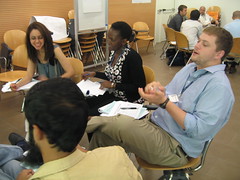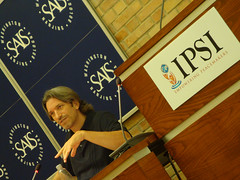 The thing that has impressed me about the Bologna Symposium has been, as expected, the wealth of learning that takes place outside of the classroom. Other students have already written about the real-world applications of the negotiation training that came about from a misunderstanding of pricing at the soccer field (or football pitch, for the rest of the Anglophone world) and the amazing simulation on negotiating with militants arranged by Maria. But I’m talking about the conversations and interactions.
The thing that has impressed me about the Bologna Symposium has been, as expected, the wealth of learning that takes place outside of the classroom. Other students have already written about the real-world applications of the negotiation training that came about from a misunderstanding of pricing at the soccer field (or football pitch, for the rest of the Anglophone world) and the amazing simulation on negotiating with militants arranged by Maria. But I’m talking about the conversations and interactions.
I am constantly amazed by the stories of my classmates, from one student getting saved from a Pakistani police station by his embassy to hiking the border areas between India and Pakistan, from building schools in Uganda to working in Rwanda. The diversity of experience offered by this group is phenomenal. This week, though, I’ve been noticing the importance of family.
Last night, Maria, a staff member from Pakistan, gave perhaps the best one-sentence summation of the knowledge we’re taking away from this: you have to let go of your pre-conceived perceptions. She told me about the first time she went to India, a country which is, according to conventional wisdom, an enemy and existential threat to Pakistan. Everyone warned her to be careful and watch out, because she would be a target. Except her father, who told her to go with an open mind, which she did. Now, she counts Indians among her best friends. That is how we’re going to have peace: by talking, understanding, and having an open mind. And she’s able to pass these lessons of cultural understanding to her students at the National Defense University in Islamabad. It is amazing the lessons we can take from our parents. Maria’s father understood what so many in his country and mine have been unable to grasp.
 Other parents have been important this week. John Prendergast, who spoke on Tuesday about the conflicts in the Sudan and Democratic Republic of Congo (DRC) brought his mother to Italy for the symposium. Claire is an absolute delight, and her influence on her son is apparent (her other son is a teacher in a low-income school in Philadelphia). John has been instrumental in mobilizing my generation for positive action in Africa and has been active in the Big Brother programs in Philadelphia and Washington for nearly 30 years. Lives are changing all over the world because of Mrs. Prendergast and the love she passed on to her sons.
Other parents have been important this week. John Prendergast, who spoke on Tuesday about the conflicts in the Sudan and Democratic Republic of Congo (DRC) brought his mother to Italy for the symposium. Claire is an absolute delight, and her influence on her son is apparent (her other son is a teacher in a low-income school in Philadelphia). John has been instrumental in mobilizing my generation for positive action in Africa and has been active in the Big Brother programs in Philadelphia and Washington for nearly 30 years. Lives are changing all over the world because of Mrs. Prendergast and the love she passed on to her sons.
My own family has played a slightly larger role than usual this week. Monday afternoon, I had the opportunity to present a short documentary that my younger sister made while in Uganda earlier this year looking at the “gay bill” currently under consideration in the Ugandan parliament. We then had a Skype discussion with her (from 9 time zones away) and about a dozen of the students here. As a proud big brother, it was a great moment; and as an American — so often viewed as arrogant and closed-minded — it was a relief to see that there are people like her who care, and who are literally willing to risk harm to look at tough issues. But I’d be remiss if I didn’t recognize how much that outlook came from our parents. It’s my and my sister’s generation that will change the world, but we are who we are because they are who they are.
But I’d be remiss if I didn’t recognize how much that outlook came from our parents. It’s my and my sister’s generation that will change the world, but we are who we are because they are who they are.
My two and a half weeks in Italy have been amazing, and I know the final week and a half will be equally exciting. The learning experiences are incomparable. But for as much as I’m learning about the theory and practice of peace and reconciliation, perhaps the most important things I’m learning about myself (and I’d wager it’s the same for many of us). When I step off the plane in Washington this month, I’ll be better prepared to take these lessons and use them for the positive change that I know we can make.
Matt Hughes, USA
P.S. Mom, you can stop crying now.

